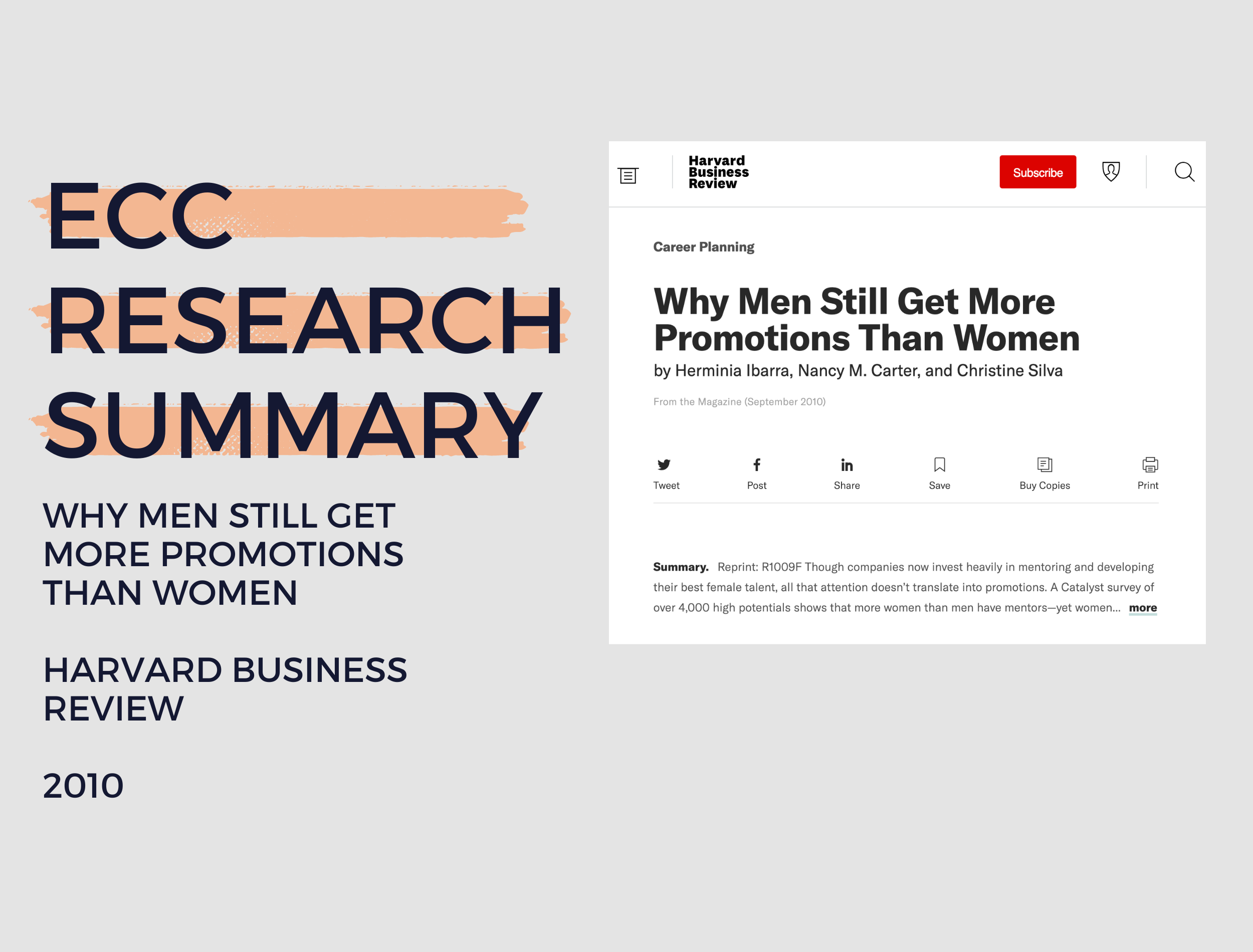A Summary of Why Men Still Get Promoted More than Women
This research tackles a critical paradox: despite significant investments in mentorship and sponsorship programmes, major global companies still promote women less frequently than men.
The paper compares 2008 and 2010 Catalyst surveys, identifying disparities in these programmes for men and women and the consequences for career advancement.
Through 40 in-depth interviews with high-potential men and women selected by their employers for the mentoring programmes, the study reveals a troubling gap- While women receive mentorship, men are given more prestigious mentorships and sponsorships. Women's sponsorships are rarely from senior leadership, limiting their networking and career advancement, whereas men are given greater access to mentors and sponsors, likely from a senior member of the organisation making them more likely to be promoted to leadership roles. This imbalance in the quality and quantity of mentorships and sponsorships between men and women emphasises the urgent need for organisations to rectify the issue.
Context
While the paper is over a decade old, the growing dichotomy between men and women’s career progression remains relevant. As of 2023, despite making up almost half of the global workforce, women only held 32.2% of senior leadership positions. This prompts questions surrounding the persistence of the issue and why workplace interventions are still falling short in its attempts to rectify the inequality.
Women often face significant barriers to promotion due to the "triple shift" effect, where they juggle caregiving, spousal duties, and professional obligations. In 2024, working women in the UK spent an average of 57 minutes more than men each day on unpaid tasks, such as housework and caregiving.
Compounding the “triple shift”, organisational career ladders were originally developed for men, meaning women are trying to succeed in a system that fails to account for them or their needs, making women’s career advancement less linear than their male counterparts.
Additionally, women experience process bias in promotions whereby they are rated lower for leadership potential than men, despite their high performance. Mentorships alone cannot close the promotion gap, as they often fail to create the meaningful change needed.
The Significance of Sponsorship for Women:
Insufficient Sponsorship: While women have benefited from substantial mentorship, they need more adequate sponsorship. Although organisations are investing in mentoring programmes, the sponsorship component is also crucial for career advancement, highlighting the need for programme refinement.
“Gatekept” Opportunities: Women gain significantly from sponsors who advocate for them and help them access opportunities. In mentorship programmes that include sponsorship, 78% of men are mentored by senior executives, compared to only 69% of women. Conversely, women are more likely to be mentored and sponsored by non-managers or first-level managers (7%) than men (4%), creating an imbalance that undermines program effectiveness for women. Furthermore, men remain more likely to receive promotions following mentorship and sponsorship, with 72% achieving promotions compared to 65% of women.
This research is valuable as it investigates why large multinational companies promote women less often, despite investing heavily in mentorship and sponsorship programmes. One of the authors of this piece is Herminia Ibarra, a Professor of Organisational Behaviour at London Business School. She has contributed to the sponsorship discourse for decades, particularly on why it is critical for women’s career development and progression.
Reinforcing the significance of Ibarra’s 2010 research is a more recent 2021 article by Rosalind Chow, titled "Don't Just Mentor Women and People of Colour. Sponsor Them". It advances the conversation of women’s sponsorship for while Ibarra’s paper identifies shortcomings in mentoring programmes, Chow dives deeper into these issues through a more contemporary and intersectional lens. Together, they advocate for transformative sponsorship support, which is crucial in our current work environment for women’s progression in the workplace. The findings of the 2021 paper are as follows:
Differences in Mentorship and Sponsorship:
.png?width=726&height=408&name=Untitled%20design%20(6).png)
How to Employ Sponsorship for Women’s Career Advancements:
- Offer sponsorship training to address the limitations of mentoring, which include restricted influence within networks, inconsistent commitment, a lack of advocacy, and a narrowed perspective from other professional viewpoints.
- Ensure that women are paired with high-level sponsors who recognise their high potential and understand the goals of the development program. Both parties should clearly understand the programme’s intent, allowing sponsors to advocate effectively for career advancement.
- Encourage individuals to seek sponsorship for themselves and to sponsor others actively. We can foster a more equitable workplace by identifying high-potential protégés and advocating for their success.
Although sponsorship on its own cannot resolve systemic issues, it is a significant step towards the right direction of promoting equity and supporting underrepresented individuals in their careers. With projections estimating that it will take 22 years for white women to achieve gender parity and 48 years for women of colour, we must act decisively. By committing to effective sponsorship practices and advocating for change, we can address these gender disparities. At ECC, we have seen first-hand through our coaching and women’s development how transformative effective sponsorship can be.
To find out more about the research summaries referenced in this summary, visit:
Women’s Progression in the Workplace (KCL)
When Women Lead, Firms Win (S&P)
To find out more about sponsors, visit:
Click here to learn more about the research-inspired: ‘The Overlooked’

